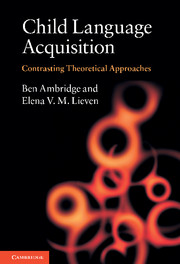44 results
Many ways to decline a noun: Elicitation of children’s novel noun inflection in Estonian – ERRATUM
-
- Journal:
- Language and Cognition / Volume 15 / Issue 1 / January 2023
- Published online by Cambridge University Press:
- 24 November 2022, p. 215
-
- Article
-
- You have access
- Open access
- HTML
- Export citation
Many ways to decline a noun: elicitation of children’s novel noun inflection in Estonian
-
- Journal:
- Language and Cognition / Volume 13 / Issue 4 / December 2021
- Published online by Cambridge University Press:
- 02 November 2021, pp. 693-733
-
- Article
-
- You have access
- Open access
- HTML
- Export citation
Structural and interactional aspects of adverbial sentences in English mother-child interactions: an analysis of two dense corpora
-
- Journal:
- Journal of Child Language / Volume 48 / Issue 6 / November 2021
- Published online by Cambridge University Press:
- 22 January 2021, pp. 1150-1184
-
- Article
-
- You have access
- Open access
- HTML
- Export citation
Chapter 14 - Developing Language from Usage: Explaining Errors
- from Part VII - Acquisition and Transmission
-
-
- Book:
- The Changing English Language
- Published online:
- 13 July 2017
- Print publication:
- 20 July 2017, pp 321-331
-
- Chapter
- Export citation
Given–new/new–given? Children's sensitivity to the ordering of information in complex sentences
-
- Journal:
- Applied Psycholinguistics / Volume 36 / Issue 3 / May 2015
- Published online by Cambridge University Press:
- 25 July 2013, pp. 589-612
-
- Article
- Export citation
6 - Simple syntax
-
- Book:
- Child Language Acquisition
- Published online:
- 05 June 2012
- Print publication:
- 17 March 2011, pp 191-268
-
- Chapter
- Export citation
Contents
-
- Book:
- Child Language Acquisition
- Published online:
- 05 June 2012
- Print publication:
- 17 March 2011, pp v-vi
-
- Chapter
- Export citation
1 - Introduction
-
- Book:
- Child Language Acquisition
- Published online:
- 05 June 2012
- Print publication:
- 17 March 2011, pp 1-12
-
- Chapter
- Export citation
Preface
-
- Book:
- Child Language Acquisition
- Published online:
- 05 June 2012
- Print publication:
- 17 March 2011, pp xiii-xiv
-
- Chapter
- Export citation
References
-
- Book:
- Child Language Acquisition
- Published online:
- 05 June 2012
- Print publication:
- 17 March 2011, pp 387-426
-
- Chapter
- Export citation

Child Language Acquisition
- Contrasting Theoretical Approaches
-
- Published online:
- 05 June 2012
- Print publication:
- 17 March 2011
List of boxes
-
- Book:
- Child Language Acquisition
- Published online:
- 05 June 2012
- Print publication:
- 17 March 2011, pp xi-xi
-
- Chapter
- Export citation
4 - Theoretical approaches to grammar acquisition
-
- Book:
- Child Language Acquisition
- Published online:
- 05 June 2012
- Print publication:
- 17 March 2011, pp 103-136
-
- Chapter
- Export citation
Frontmatter
-
- Book:
- Child Language Acquisition
- Published online:
- 05 June 2012
- Print publication:
- 17 March 2011, pp i-iv
-
- Chapter
- Export citation
List of summary tables
-
- Book:
- Child Language Acquisition
- Published online:
- 05 June 2012
- Print publication:
- 17 March 2011, pp xii-xii
-
- Chapter
- Export citation
2 - Speech perception, segmentation and production
-
- Book:
- Child Language Acquisition
- Published online:
- 05 June 2012
- Print publication:
- 17 March 2011, pp 13-60
-
- Chapter
- Export citation
3 - Learning word meanings
-
- Book:
- Child Language Acquisition
- Published online:
- 05 June 2012
- Print publication:
- 17 March 2011, pp 61-102
-
- Chapter
- Export citation
7 - Movement and complex syntax
-
- Book:
- Child Language Acquisition
- Published online:
- 05 June 2012
- Print publication:
- 17 March 2011, pp 269-313
-
- Chapter
- Export citation
Author index
-
- Book:
- Child Language Acquisition
- Published online:
- 05 June 2012
- Print publication:
- 17 March 2011, pp 427-431
-
- Chapter
- Export citation
9 - Related debates and conclusions
-
- Book:
- Child Language Acquisition
- Published online:
- 05 June 2012
- Print publication:
- 17 March 2011, pp 359-376
-
- Chapter
- Export citation

